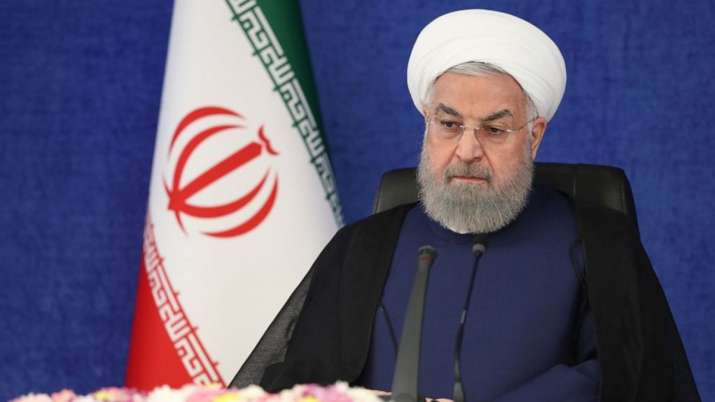
President Hassan Rouhani attends a meeting of the national task force to fight the coronavirus in Tehran
President Hassan Rouhani said on Saturday that Iran could face another wave of coronavirus infections, as health officials warned of the spread of the more contagious delta version of the virus. Rouhani, speaking at a National Coronavirus Task Force meeting, urged people “to postpone their summer travel and gatherings to prevent the spread of the virus, especially its Indian version.
“Iran has reported cases of the delta variant in several cities and towns.” “There are concerns that we go in the direction of a fifth wave,” he said. “In the southern provinces we should apply more treatment since the delta version has infiltrated there,” Rouhani’s website reported his remarks.
Iran is one of the worst-hit countries in the world by the virus and in the Middle East. The capital Tehran and more than 90 other cities and towns have been declared red zones, requiring 70 percent of office workers to work from their homes. It also requires closure of public places like movie theatres, gyms and restaurants.
The recent spike in cases has pushed some hospitals to the border in southeastern Sistan and Balochistan province, which is neighboring Pakistan, already suffers from poor health care facilities. The province of more than 2.7 million has seen a daily death toll of around 15, fueled by tribal gatherings and campaign gatherings ahead of June’s municipal elections.
On Thursday, provincial government Ahmed Ali Mohebati said some patients needed to travel nearly 100 kilometers (60 miles) to reach a health care facility. “Now, there is a shortage of hospitals in ten cities in the province,” he said. Mohebati predicted a rise in new cases later this month due to celebrations and visits related to the Muslim Eid holidays.
Authorities have promised to prepare field hospitals and more medical and emergency equipment and have also closed three border points with Pakistan in the province.
The death toll from COVID-19 rose by 111 in the past 24 hours on Saturday, Iranian officials said, bringing the country’s total to 84,627 since the pandemic broke out last year. Officials said 8,341 new confirmed cases were reported in the same period, bringing the total to more than 3.24 million. Reports said 3,207 patients are in critical condition, and 2.91 million people have been cured so far.
In April, Iran experienced its fourth wave of the disease, with officials reporting the highest new coronavirus case numbers – more than 25,000 a day. Its daily death toll rose to nearly 400, down from a grim record of 486 in November.
Meanwhile, Iran is suffering from a slow vaccine rollout, despite producing three vaccines. These include the domestic COVIran Barekat and the Cuban-made Sobrana, which is produced in Iran as a Pasteur vaccine.
There is also domestic production of Russia’s Sputnik V, which Iran continues to import as well. So far, less than 7 million doses of the vaccine, mainly imported, have been administered nationwide, including about 2 million second doses of the vaccine. Of the 7 million, only 300,000 were Iran-made.
The government has promised to start mass vaccination in September. Iran’s local vaccine research has picked up steam while officials allege heavy US sanctions will hinder efforts.
Iran participates in COVAX, an international initiative designed to distribute vaccines to countries regardless of their wealth. But international banks and financial institutions are reluctant to deal with Iran for fear of US penalties. Under COVAX rules, Iran can order enough doses to vaccinate half of its more than 80 million people.
.